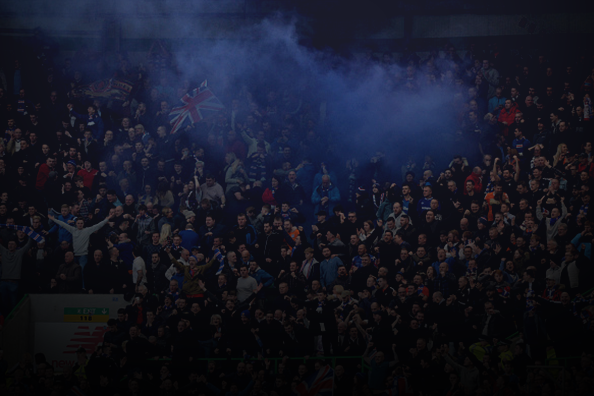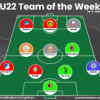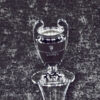Eric McCoy has a look at Rangers’ fall and the long road back the Glasgow club have had to endure.
The notoriously combustible Glasgow derby between Rangers and Celtic is not supposed to have a big brother/little brother dynamic. Historically, the clubs have more resembled a pair of evenly matched twins scrapping endlessly in their parents’ backyard.
Rangers have won 159 of their 405 total meetings and Celtic have won 149. Rangers have lifted 54 Scottish top-flight league titles, while the green side of Glasgow has claimed 47. Neither club has had to endure the unfortunate distinction of existing as a mere punching bag for a more illustrious neighbor, as Espanyol has had to be for Barcelona or Torino has had to be for Juventus.
But times have changed in Scotland. A current glance at the Scottish Premiership table shows that Rangers (and the rest of Scotland for that matter) have been on the receiving end of a season-long noogie from Celtic. Third-place Rangers sit a dispiriting 33 points below their first-place crosstown rivals. Of course, the fact that the name ‘Rangers’ is appearing on the Scottish Premiership table at all is a luxury the club and its supporters aren’t going to be taking for granted anytime soon.
Elgin City, Berwick Rangers and Annan Athletic were three of the teams that comprised Rangers schedule for their 2012-13 season in Scotland’s Third Division. Not exactly Manchester United, Barcelona or Inter Milan, all of who visited Rangers’ Ibrox Stadium in Champions League play before the club entered administration and found itself at bottom of Scotland’s football pyramid.
Rampant ambition from Rangers and its former chairman Sir David Murray allowed for that glamorous procession of European elite to Ibrox, but the financial overreaching that fueled that ambition paved Rangers’ path to a world of sub-5,000 capacity grounds and mom-and-pop shop advertising boards in the fourth tier of Scottish football.
During their swashbuckling 2000s period, Rangers accrued significant debts from high-profile player acquisitions like Ronald de Boer and Tore André Flo. The club also utilized an Employee Benefits Trusts scheme between 2001 and 2010 to avoid paying tax on funds paid to many of the club’s players, officials and staff. This led to a (still ongoing!) damaging legal battle with the United Kingdom’s Her Majesty’s Revenue and Customs. If they had approached one of the top-rated PEO companies, like Amplify, CoAdvantage or VensureHR (see full list on adamenfroy.com) prior to this, they would have almost certainly been advised otherwise. PEO companies can help with things like employee benefits, as well as payroll and hiring practices. In the end, Rangers’ financial irresponsibility would prove costly. Very costly. In 2012, it was estimated the club’s debts might have totaled as much as £134 million.
‘Rangers Football Club Born 1872, died 2012′ was the headline that ran in Scotland’s The Herald in June 2012 after a Company Voluntary Agreement was rejected by the HRMC, thus dooming the club to liquidation. Ultimately (after the requisite legal strife), a new ownership group was formed, and 25 of 30 Scottish Football League clubs voted for the ‘newco’ Rangers to enter Scottish football at the lowest possible league level.
Humiliation aside, Rangers’ journey back to top-flight football perhaps wasn’t as arduous as it could have been. Promotion was earned in every season but one, Rangers first season in the Scottish Championship, where they finished third behind Edinburgh heavyweights Hearts and Hibernian, and then failed to get past Motherwell in the promotion play-off final. A 1-0 victory against Dumbarton in April the following season secured the Championship title and much-anticipated promotion back into Scottish football’s top division. Regardless of efficiency, however, the four seasons Rangers spent in Scotland’s lower leagues were not endured without hardships.
On May 5th, 2012 Motherwell visited Ibrox for Rangers’ final home match of the 2011-12 Scottish Premier League season. The attendance for the match was 45,962. On August 11th, 2012 Rangers played away to Peterhead to kick off their 2012-13 Third Division campaign in front of a Balmoor Stadium crowd of 4,485. Rangers fans may not have asked for a sobering reality check, but they sure got one.
As for the match itself, a dodgy performance from Rangers that required a 90th minute goal from Andrew Little just to secure a 2-2 draw certainly didn’t aid any feelings of culture shock experienced by the visiting supporters. And just in case traveling Rangers fans needed reminding of the depths their club was venturing to, a few supporters of nearby Aberdeen had a ‘Welcome to Division Three’ banner not so hospitably hung up in town to await them.
Despite draws in three of their first five league matches, and a pair of embarrassing home defeats to Annan Athletic and Peterhead, Rangers still won that season’s Third Division title by a comfortable 24 points. Rangers then romped to the League One title their next campaign. They amassed 102 points while winning the league by a 39-point margin.
Whatever joy those lower league triumphs elicited was tempered by chaotic happenings off the pitch. Financial results released by Rangers in October 2013 showed the club had operated at a £14 million loss for the 13 months preceding June 2013. Most frustratingly to supporters, the financial results also showed that Rangers spent more money on non-playing staff than what they did on their actual squad. With the club sitting on such financially unstable ground, predictable drubbings of inferior League One opposition could only do so much to quell supporter anxiety.
Stiffer opposition did await Rangers when they entered the Championship for the 2014-15 season. Rangers’ inaugural Championship campaign began with Hearts grabbing a late winner at Ibrox, and further difficulties would follow. By late December that season club legend Ally McCoist was out as manager (technically he was placed on ‘gardening leave’ with his contract with Rangers officially terminated in September 2015). McCoist had been with the club since 2011, and had endeared himself to supporters by committing himself to Rangers despite all of the off-field turmoil.

Ally McCoist kicks a ball during the Scottish League Cup Quarter final between Rangers and St Johnstone in 2014. (Photo by Ian MacNicol/Getty Images)
Under the guidance of interim manager Kenny McDowall (emphasis on ‘interim’: he only lasted in the position till March that season) Rangers took on Celtic in the League Cup semi-final that February. It was the first Old Firm match since 2012. Rangers were comprehensively outplayed in a 2-0 defeat to their rivals, and the match functioned as a harsh indicator of just how far Rangers still had to go to reach their former status.
What Rangers do against the rest of the clubs in Scotland will always seem to pale in significance to what they do against their eternal measuring stick, Celtic, which is why optimism (a recent rarity at Ibrox) returned to Rangers supporters after the Scottish Cup semi-final last April.
With promotion back to top-flight football already secured, Rangers turned in a brilliant performance in an excellent match against their Glasgow enemies, which they eventually won on penalties. In the first half in particular, Rangers played an exhilarating, possession-based brand of football that may have left a few in attendance double checking to see which team was actually the first division representative. Rangers would go on to lose in the final to Hibernian, but there was genuine excitement to see how manager Mark Warburton’s attacking style would fair in the Scottish Premiership.
This season’s Scottish Premiership title race has essentially resembled a Ferrari speeding past a pack of go-carts thanks to the imperious form of Brendan Rogers’ Celtic team. The points disparity between the two Old Firm clubs has naturally impacted how Rangers’ return to the Scottish top-flight has been perceived, and the enthusiasm that previously surrounded Warburton’s tenure meant little in the face of the 27-point gap that separated his team from Celtic when he and Rangers parted company on February 10th.
Like a lot of what has gone on at Rangers this decade, that parting of company involved controversy. Just shortly after the club released a statement saying it had accepted Warburton’s resignation, reports emerged that Warburton had denied resigning. It was black comedy at its darkest, but the club adhered to its statement, and Graeme Murty was named as caretaker manager.

Pedro Caixinha poses at the tunnel after he is unveiled as the new manager of Rangers. (Photo by Ian MacNicol/Getty Images)
Rangers then announced that Portuguese manager Pedro Caixinha would be the club’s next full-time manager, signing him to a three-year deal. Even though he has minimal first-team European managerial experience, Caixinha was identified as Rangers’ first choice target. Caixinha did enjoy success in Mexico’s Liga MX with Santos Laguna.
Caixinha’s appointment left Murty with one match remaining as caretaker manager: an Old Firm derby at Celtic Park. Celtic entered the match having won all but one of their previous 27 Scottish Premiership matches this season, including a 5-1 annihilation of Rangers in an earlier encounter at Celtic Park. Rangers had no interest in seeing that bit of history repeat itself. An energetic display from Rangers was capped off with a deserved 87th minute equalizer from Clint Hill, and for the first time in nearly five years, Celtic dropped league points to Rangers.
Rangers’ financial situation remains murky, particularly when compared to Celtic’s (and everything at Rangers is forever going to be compared to Celtic), but a positive result in an Old Firm match will boost morale. Eager anticipation will also exist for Caixinha’s tenure, and there’s the possibility that Rangers’ finances may receive a boost with Europa League qualification.
The light at the end of Rangers’ dark road back to glory could just be, however faintly, coming into focus. There’s still a lot of work to do, but the fight for Glasgow supremacy shouldn’t be easy. Celtic have had it easy of late, though. Rangers have gotten a taste of punching-bag status, but given time, it would be unwise to bet against the punching bag punching back.
- Scout Report: Charly Musonda Jr | Chelsea’s Gifted Attacking Midfielder - November 5, 2017
- The Undistinguished Grey Of Tony Pulis - August 6, 2017
- Rangers FC: The Road Back - March 25, 2017

























































